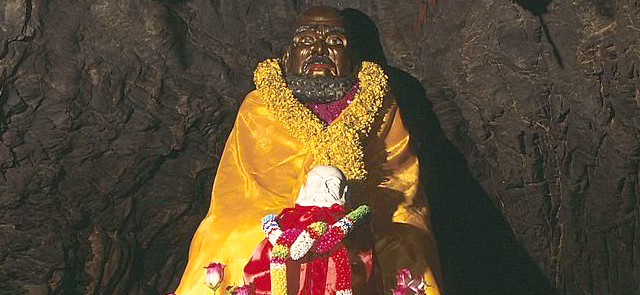If we had the power to control our moods we would all live a fulfilled and harmonious life. When we are happy we often wonder how long it will last, instead of enjoying it. When we are sad we reminisce about the good times. When we are angry we eventually end up apologising profusely to everyone we have upset. The underlying current in all our moods is the negative influences that we create or pick up from our environment.
These influences have a resounding affect on our meditation practice. We all seek peace and harmony. We try so hard to avoid negativity and the inherent failures and tension that can arise from being negative or being around negative influences. So how and why do we generate and perpetuate these feelings when we are aware of their consequences.
Negativity and the barriers that it creates can not coexist with harmony and this is a great hindrance for our meditation practice.From time to time we all experience, stress, tension, and anxiety. Strong negative emotions are difficult to contain and have a contagious affect. This stress permeates the atmosphere and can strain our daily life. Fortunately meditation has a calming and balancing affect on our moods and emotions however lets look a little bit at how negativity arises and how it can be dealt with once it is acknowledged.
Master Shi Yan Zhuo
How do we start generating negativity?
We become very unhappy when we find someone behaving in a way we don't like, or we find unwelcome obstacles appearing in our daily routines. Our natural impulsive responses normally leads to tension and anger within us. We suffer as a result of this tension. Throughout life, events we don't like keep on happening. What we wanted may or may not happen. This repetitive process becomes perpetual and makes the entire mental and physical structure so tense, so full of negativity, that we end up aggressively creating huge barriers around us.
We normally find something or someone to blame for being unhappy. We might have even changed many aspects of our lives expecting immediate satisfaction and happiness. Unfortunately often we are ignorant of the inner reality, we never properly understand that the cause of suffering lies within. As a result of our instinctive and blind reactions toward pleasant and unpleasant sensations we had never imagined that it is possible to control our moods.
When anger arises, it overpowers us so quickly that we don't even notice. Dominated and overpowered by anger our impulsive reactions is aggressive and can be physically or vocally harmful to us or to others. Later, when the anger has passed, we realise the consequences of our overblown reaction. But the next time we are in a similar situation, we again react in the same way. The constant apologising and guilt is not the proper way to deal with our difficulties.
One solution to the problem is to arrange that nothing unwanted happens in our lives and that everything keeps on happening exactly as we desire. Unfortunately this is only possible. There is no one in the world whose desires are always fulfilled, without anything unwanted happening. So the question arises, How do we live a stress free life devoid of anger? How do we remain peaceful and harmonious?
Another immediate solution to consciously stopping the seeds of anger is diversion. If something unwanted happens and we start to react by generating anger, fear or any negativity, then as soon as possible we should divert our attention to something else. For example, counting numbers, listening to some music, or going for a walk. The mind is diverted, the anger will not multiply, and to some extent, the negativity will pass by.
By practicing this, the mind feels free from agitation in the short-term. However, the solution only works at the conscious level. By diverting our attention from the anger, we push the negativity deep into the unconscious, and on this level we have no control over it or what affects it may have on us in the future. At the surface level there is a layer of peace and harmony, but in the depths of the mind we have banished a sleeping volcano of suppressed negativity which sooner or later will explode in violent eruption.
Diverting the attention is only running away from the problem. Escape is no solution if the anger festers and appears with more vengeance. Whenever negativity arises in the mind, we should acknowledge it, and face it. As soon as we start observing it, it begins to lose strength and slowly withers away and is uprooted. We are free.
The difficulty is that we are not aware when this anger starts. It begins deep in the unconscious level of the mind, and by the time it reaches the conscious level, it has gained so much strength that it and controls our actions and overwhelms us. This stealth like appearance of anger means that no matter how many times we consciously tell ourself not to get angry, in the heat of the moment we are left at the mercy of our irrationality.
Even supposing our rational mind and wisdom prevails and we sit down and observe our anger. Our conscious control of the events is only aware of the emotions. We observe the external stimulus of this emotion but fail to deal with the pent up anger. This will only serve to multiply the anger inside and is no solution. It is very difficult to observe any abstract negativity, abstract emotion, divorced from the external object which aroused it.
However there is a practical solution, if we observe and learn from our reactions to negativity and are aware of our impulsive reactions we will overcome all our barriers. Whenever there are negative emotions in the mind, simultaneously two things start happening at the physical level. One is that the breath loses its normal rhythm. We start breathing hard whenever we experience negative emotions. This is easy to observe. At subtler level, some kind of biochemical reaction starts within the body--some sensation. Every impulse will generate one sensation or another inside, in one part of the body or another.
If we observe these particular reactions to negativity in ourself and become aware of them, our awareness will develop an early warning system that will alert us to impending negative emotions. An ordinary person cannot adequately control instincts or emotions of the mind; fear, anger, or passion. But by observing and practice, it is very easy to become aware of our bodily sensations which are directly related to the arousing of emotions. Whether it is, breath or sensation, we learn to become aware of it. Instead of just reacting, we allow that particular negative emotion to pass away without losing the balance of the mind.
In this way, the techniques of self-observation shows us reality in its two aspects, inner and outer. Instead of running away from the problems, we become aware of them. The negativity will lose its strength and it will no longer be able to overpower us . If we persist, and increase our awareness and knowledge of ourself, emotions we want to avoid eventually disappear altogether. Gradually the mind becomes free and we remain peaceful and happy.
The more we know ourself and our reactions to emotions, the easier it becomes to use this technique. We no longer depend on the habit of reaction. When we cease to react blindly, then we are capable of seeing our real inner self.
The inner self resulting from a balanced mind, a mind which sees and understands the truth.Such action can only be positive, creative, helpful to oneself and to others.When we reach this stage, the entire pattern of our life starts changing. The balanced mind not only becomes peaceful in itself, but it helps others to become peaceful by creating and encouraging a peaceful environment.
Master Shi Yan Zhuo [Chin.: shìyánzhuó dàsh? ????? | 1965 - ?]
By learning to remain balanced in the face of everything we experience inside, we develop a detachment towards all negativity that we encounter in external situations. However, this detachment is not escapism or indifference to the problems of the world. We just observe nature as it is and are aware of our reactions to it.







